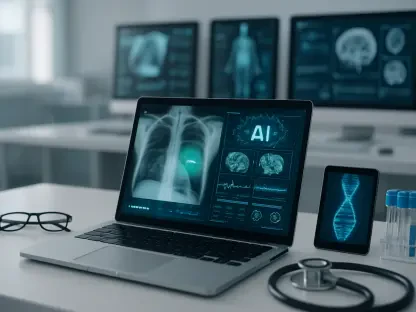In today’s rapidly evolving world of technology and healthcare, artificial intelligence is making remarkable strides in reshaping medical practices. James Maitland, an expert in robotics and IoT applications in medicine, offers insightful perspectives on how AI can be a transformative force in healthcare. With a focus on improving efficiency and patient outcomes, James explores the multifaceted role of AI in reducing burnout, enhancing decision-making, and bridging data across complex healthcare systems.
What are some common misconceptions about AI in healthcare among providers?
One of the most pervasive misconceptions is the fear that AI will replace human physicians. In reality, AI is more of a complement to human expertise rather than a replacement. Many providers worry about losing the human touch, but AI is really about enhancing clinical capabilities by taking over repetitive tasks and allowing providers to focus more on patient care. By understanding AI as a partner in healthcare, we can shift from fear to empowerment.
How can AI help reduce burnout among healthcare providers?
AI has the potential to significantly alleviate the administrative burdens that contribute to burnout. Tasks such as clinical documentation, appointment scheduling, and medical coding can be automated, freeing up valuable time for providers to concentrate on direct patient care. This not only reduces stress but also enhances job satisfaction by allowing clinicians to do what they are trained to do: focus on patient interaction and outcomes.
What types of mundane tasks can AI handle for clinicians and staff?
AI is adept at managing a range of administrative and logistical tasks that often tie up healthcare professionals. For instance, it can automate clinical documentation and note-taking, streamline prior authorization processes, and handle appointment scheduling and reminders seamlessly. Additionally, tasks like medical coding and billing, which are detail-oriented and time-consuming, can be effectively managed by AI systems.
Can you describe how AI-powered clinical decision support tools assist in care planning?
AI-powered clinical decision support tools can dramatically improve care planning by analyzing vast amounts of data quickly. These tools integrate multiple data sources, such as medical histories and lab results, to provide comprehensive insights. This enables clinicians to prioritize patients, predict potential risks, and make diagnostic suggestions, ensuring personalized and evidence-based care strategies.
How does AI analyze and prioritize patient data?
AI systems excel at sifting through extensive datasets to identify patterns and prioritize patient care based on clinical needs and risks. By analyzing information from claims, imaging, and personal health records, AI can swiftly highlight which patients require immediate attention or might be at risk of developing chronic conditions, thereby streamlining clinical workflows and targeting interventions more effectively.
In what ways does AI contribute to better clinical decision-making?
AI contributes significantly by enhancing access to the latest medical research and treatment protocols. It acts as an extension of the clinician’s knowledge base, providing suggestions grounded in current evidence and trends. This expanded resource allows for more informed decision-making and ensures that care provided is consistent with the most recent guidelines, thus improving patient outcomes.
How can predictive AI help delay or prevent chronic diseases?
Predictive AI models are incredibly promising in preventing chronic diseases by identifying at-risk individuals before conditions manifest or worsen. By analyzing patterns and lifestyle data, AI can forecast potential health issues, allowing healthcare providers to implement proactive care plans. Such early interventions can slow disease progression or even prevent conditions altogether, significantly benefiting both patient outcomes and healthcare costs.
How does the use of AI impact the total cost of care in terms of chronic disease management?
Integrating AI into chronic disease management can greatly reduce costs by preventing disease progression and minimizing the need for extensive treatments and hospitalizations. By identifying risks early and facilitating timely interventions, AI-driven strategies can lower long-term healthcare expenditures, making the system more sustainable while enhancing patient quality of life.
How can AI improve the overall patient experience in healthcare?
AI plays a vital role in enhancing patient experiences by providing seamless and timely access to care. From virtual consultations to personalized reminders and follow-ups, AI makes interactions more convenient for patients. Moreover, by ensuring that providers have comprehensive data, it supports more tailored and efficient healthcare delivery, aligning with the tech-savvy expectations of today’s patients.
What role does AI play in integrating data across multiple healthcare platforms and providers?
AI excels in managing and integrating data from disparate healthcare platforms, thereby overcoming one of the significant challenges of modern healthcare. By normalizing data from various sources into a unified system, AI ensures comprehensive insights that facilitate coordinated care across different providers. This integration enhances consistency and continuity in patient care management.
How does AI help in identifying care gaps and ensuring timely preventive measures?
AI tools are adept at detecting care gaps, such as missed screenings or follow-up appointments, by constantly analyzing patient data. With this information, healthcare providers can proactively reach out to patients, ensuring that preventive measures are taken in a timely fashion. This not only helps in maintaining patient health but also optimizes healthcare resource utilization.
Why is embracing AI considered an ethical choice for clinicians today?
Embracing AI aligns with the ethical commitments of healthcare providers to deliver the best possible care. By adopting AI, clinicians can access advanced tools that enhance patient outcomes through improved diagnostics and treatment personalization. It is a reflection of a commitment to progress in medical science and a dedication to utilizing all available resources for patient benefit.
What future advancements in AI should healthcare providers prepare for?
Healthcare providers should prepare for advancements like generative AI and personalized medicine applications. The next generation of AI will likely offer enhanced predictive analytics and bring even greater integration into everyday practice. Staying abreast of these developments will empower providers to leverage these tools effectively, ensuring they remain at the forefront of patient care innovation.









